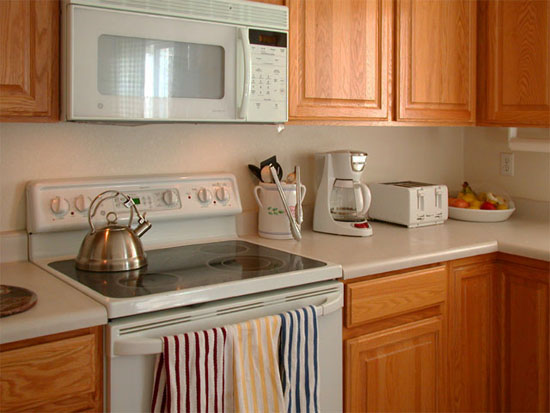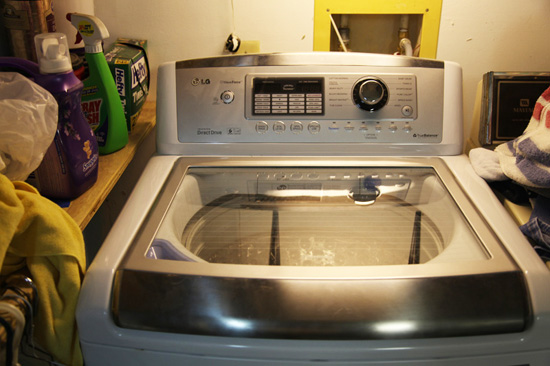Energy Saving Tips for the Kitchen
Encourage Green, Sustainable Living while Saving Money
Copyright © Chris Dixon; All rights reserved; content may not be copied, rewritten, or republished without author’s written permission; Posted July 29, 2012

People often say that the kitchen is the heart of the home; but in the hustle and bustle of a busy family kitchen, it can be easy to overlook simple steps that could save you money and reduce your carbon footprint!
Take a look through our guide on how to use each appliance in the most environmentally friendly manner. Not only will you notice the changes in your utility bills, but your appliances will last longer, saving you money on replacements and repairs!
Dishwashers
We all know that dishwashers use a lot of energy, and although it would be nice to wash everything by hand, it’s highly unlikely that we’re going to give up our little luxury appliance and spend hours washing the pots!
Instead make sure you use it sensibility —
- Always wait for a full load, but never overload; it wouldn’t hurt to wash the few leftover plates by hand or wait for the next load.
- Turn off the drying function! Many dishwashers come with a built-in drying function, but try leaving the door open and letting them dry in the air.
- Check in your manual for the best drying temperatures; you may find that there’s a way to minimize energy use and still get the same sparkling clean results!
Microwaves
Microwaves are renowned for their energy efficiency, especially when compared to a conventional oven, but try to remember that this is not always the case!
If you’re only cooking a small serving, defrosting or reheating food, or cooking a ready meal — try to use the microwave. But, if you’re cooking larger portions or a few different things, it’s more efficient to pop them all in the oven to cook together.
Cookers and Ovens
Whether you have a range cooker or a counter top oven, there are a few simple steps you can take to reduce the amount of energy you use to cook your tea:
- Don’t keep opening the door — every time you do a little more heat escapes and your oven has to work harder to get back up to temperature.
- If you own a pizza stone, leave it in the oven. It takes very little energy to heat it up, but its thermal density will keep your temperature constant for those times when you do have to open the door.
- Match the size of the pan you’re using to the size of the burner — too big and you waste energy!
- Keep your burners clean — your burners contain small reflectors. If these are kept clean they will help to heat your pots and pans quicker.
- If you have an electric stove use a flat bottomed pan; that way, more surface area connects with the heating area, making cooking quicker!
Refrigerators and Freezers
Your fridge and freezer work constantly to keep your food fresh and safe to eat, so you can’t turn it off! Instead follow these few tips to make sure it’s not wasting energy:
- Keep it clean; vacuum the coils and clean out the condensation drain hole, otherwise it will have to work harder to maintain its temperature.
- Check the seals — They can easily become damaged, letting cold air out and lowering the efficiency.
- Keep it full; if your appliance is full, it takes less energy to keep it cold. Every time you open the door, cold air escapes. If it’s full of frozen or chilled products, it takes less time to get back to temperature as there’s less space for warm air to get in.
The freezer is especially important. If you don’t have much in it, fill in some empty space with water frozen in plastic milk jugs. - Check the temperature — have a look at the manual; it may be that you have your fridge freezer working harder than you need it to!
Washing Machines
 Washing machines are often one of the appliances that use the most unnecessary energy. But don’t worry, it’s easy to make sure you use it more efficiently with just a few small adjustments:
Washing machines are often one of the appliances that use the most unnecessary energy. But don’t worry, it’s easy to make sure you use it more efficiently with just a few small adjustments:
- Wait for a full load! There’s no need to half fill it; wait until it’s full and you only have to use it once.
- Keep the temperature as low as you can — washing at 30°C (86°F) can be just as effective as washing at 50°C (122°F), and there’s less chance you’ll shrink your clothes!
In fact, why use the hot water at all? With the energy-saving movement now in full swing, detergent manufacturers have responded with appropriate products. One such example is Purex Coldwater detergent.
- Turn it off at the wall; simple but easy to forget. Many modern appliances with circuit boards, pre-sets, and clocks continued to draw a trickle of power. There’s definitely no need to leave it on when it’s not actually in use.
Tumble Dryers are another appliance that we could easily live without, but the convenience and the dreaded British weather means we aren’t in any hurry to give them up!
But try to remember, if we do get a sunny day, put your washing on the line, or dry it on clothes racks inside whenever possible.
When you do use it, make sure you fill it and use the high speed spin first to get your washing as dry as possible before putting it on.
And always remember to clean out the filter, otherwise your appliance will have to work harder than it should to dry your clothes.
Kettles
Your kettle is such a small appliance it’s easily overlooked when you’re trying to save energy! But there are a few things to remember if you’re trying to run an environmentally friendly kitchen.
- Only boil the water you need; any more and you’ll be wasting energy.
- Make sure you cover the elements to get the water hotter, quicker, and remember jug kettles have smaller elements so need less water.
- Use your kettle to boil water for cooking — it’s quicker and uses less energy than boiling a pan full of water on the hob.
Upgrade your Appliances
One of the best ways to save energy and money in the kitchen is to ensure that all your appliances are as energy efficient as possible.
When the time comes to replace old appliances, don’t look for the cheapest or the one with the most gadgets; look for the Energy Star label and take home an environmentally friendly appliance with a good energy efficiency rating.
Do you have any energy-saving tips for the kitchen? Feel free to let our readers know using the comment box below!
About the Author:
Chris Dixon writes on a variety of home-related topics, from kitchen appliances and design to environmentally-friendly living. Chris manages the Long Eaton Appliance Company, specialists in Mercury Range Cookers and other premium cooker brands.
More Recipes and Food Articles
- How to Troubleshoot and Repair Refrigerators
- Spicy Baked Habanero Chicken Recipe
- Build a Raised Bed Vegetable Garden
- Should You Steer Clear of Genetically Modified Food?
- Understanding Nutrition Labels and Serving Size
Website © 2012 Kelly Smith; All rights reserved; content may not be copied, rewritten, or republished without author’s written permission; Webmaster’s Google profile.



